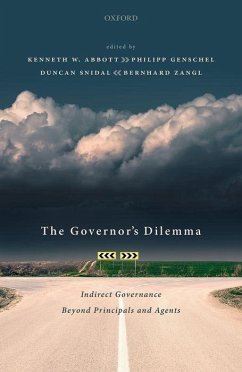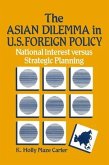The Governor's Dilemma
Indirect Governance Beyond Principals and Agents
Herausgeber: Abbott, Kenneth W; Genschel, Philipp; Snidal, Duncan; Zangl, Bernhard
The Governor's Dilemma
Indirect Governance Beyond Principals and Agents
Herausgeber: Abbott, Kenneth W; Genschel, Philipp; Snidal, Duncan; Zangl, Bernhard
- Gebundenes Buch
- Merkliste
- Auf die Merkliste
- Bewerten Bewerten
- Teilen
- Produkt teilen
- Produkterinnerung
- Produkterinnerung
Through twelve case studies, this book introduces a general theory of indirect governance based on the tradeoff between governor control and intermediary competence.
Andere Kunden interessierten sich auch für
![The Asian Dilemma in United States Foreign Policy The Asian Dilemma in United States Foreign Policy]() K Holly Maze CarterThe Asian Dilemma in United States Foreign Policy180,99 €
K Holly Maze CarterThe Asian Dilemma in United States Foreign Policy180,99 €![Conditionality & Coercion Conditionality & Coercion]() Isabela MaresConditionality & Coercion137,99 €
Isabela MaresConditionality & Coercion137,99 €![Morality and War Morality and War]() David FisherMorality and War61,99 €
David FisherMorality and War61,99 €![Rules for Rebels Rules for Rebels]() Max AbrahmsRules for Rebels83,99 €
Max AbrahmsRules for Rebels83,99 €![Theory of International Organization Theory of International Organization]() Liesbet HoogheTheory of International Organization139,99 €
Liesbet HoogheTheory of International Organization139,99 €![The Theory of Political Culture The Theory of Political Culture]() Stephen WelchThe Theory of Political Culture163,99 €
Stephen WelchThe Theory of Political Culture163,99 €
Through twelve case studies, this book introduces a general theory of indirect governance based on the tradeoff between governor control and intermediary competence.
Produktdetails
- Produktdetails
- Verlag: Oxford University Press
- Seitenzahl: 314
- Erscheinungstermin: 11. Mai 2020
- Englisch
- Abmessung: 229mm x 155mm x 23mm
- Gewicht: 612g
- ISBN-13: 9780198855057
- ISBN-10: 0198855052
- Artikelnr.: 58342787
- Herstellerkennzeichnung
- Libri GmbH
- Europaallee 1
- 36244 Bad Hersfeld
- gpsr@libri.de
- Verlag: Oxford University Press
- Seitenzahl: 314
- Erscheinungstermin: 11. Mai 2020
- Englisch
- Abmessung: 229mm x 155mm x 23mm
- Gewicht: 612g
- ISBN-13: 9780198855057
- ISBN-10: 0198855052
- Artikelnr.: 58342787
- Herstellerkennzeichnung
- Libri GmbH
- Europaallee 1
- 36244 Bad Hersfeld
- gpsr@libri.de
Kenneth W. Abbott is Jack E. Brown Chair in Law and Professor of Global Studies Emeritus at Arizona State University. His research focuses on the interdisciplinary study of international institutions, international law, and international relations. He studies public and private governance in fields including environmental protection and he held the Elizabeth Froehling Horner Chair at Northwestern University School of Law, and served as director of Northwestern's Center for International and Comparative Studies. He is a Lead Faculty member of the Earth System Governance Project, and a member of the editorial boards of International Theory, Regulation & Governance, and Journal of International Economic Law. Bernhard Zangl is a Professor of Global Governance at LMU Munich's Geschwister-Scholl-Institute of Political Science. His research focuses on the role of international institutions in global governance. He is a co-editor of International Organizations as Orchestrators. His research was published in the Annual Review of Political Science, British Journal of Political Science, European Journal of International Relations, International Studies Quarterly, Review of International Organizations, Journal of Common Market Studies among others. He studied in Tübingen and Pisa, holds a PhD from the Universität Bremen, and has held visiting positions at the European University Institute, Harvard University, Northwestern University, and the Berlin Social Science Center. Duncan Snidal is Professor of International Relations at the University of Oxford and a fellow of both Nuffield College and the British Academy; he previously taught at the University of Chicago. His research focuses on problems of international cooperation and institutions with an emphasis on institutional design. He is co-editor of International Organizations as Orchestrators and co-author of Institutional Choice and Global Commerce. Recent articles have appeared in International Organization, British Journal of Political Science, Journal of Conflict Resolution and the Annals of the American Academy. He is cofounder of the journal International Theory and general co-editor of a forthcoming twelve volume set of Oxford Handbooks of International Relations. Philipp Genschel is Professor of Comparative and European Public Policy at the European University Institute in Florence; he is on leave from Jacobs University Bremen. His research focuses on the political economy of governance at the national, the European and the international level. He is co-editor of Beyond the Regulatory Polity? The European Integration of Core State Powers (OUP 2014), of International Organizations as Orchestrators (CUP 2015), and of the Tax Introduction Database. Recent articles have appeared in British Journal of Political Science, Journal of Common Market Studies, Review of International Political Economy and Review of International Organization.
* Part I. Theoretical Framework
* 1: Kenneth W. Abbott, Philipp Genschel, Duncan Snidal, and Bernhard
Zangl: Competence-Control Theory: The Challenge of Governing through
Intermediaries
* Part II. Governing Violence
* 2: Paul K. MacDonald: The Governor's Dilemma in Colonial Empires
* 3: Henry Thomson: The Authoritarian Governor's Dilemma: Controlling
the Secret Police in Socialist Poland and East Germany
* 4: Alexander Thompson: Competence over Control: The Politics of
Multilateral Weapons Inspections
* 5: Idean Salehyan: Militias and the Iraqi State: Shifting Modes of
Indirect Governance
* 6: Henning Tamm: The Invader's Dilemma: Enlisting Rebel Groups
* 7: Andreas Kruck: Governing Private Security Companies: Politics,
Dependence and Control
* Part III. Governing Markets
* 8: Jack Seddon and Walter Mattli: Governing Capital Markets
* 9: Felix Biermann and Berthold Rittberger: Balancing Competence and
Control: Indirect Governance "Triangles" in EU Regulation
* 10: Thomas Rixen and Lora Viola: Indirect Governance in Global
Financial Regulation
* 11: Manuela Moschella: Managing the Euro Crisis: Why Enlist the IMF?
* 12: Johannes Gerschewski: Governing Markets in Autocratic Regimes
* Part IV. Implications for Democracy
* 13: Mark A. Pollack: Trump's Dilemma
* 1: Kenneth W. Abbott, Philipp Genschel, Duncan Snidal, and Bernhard
Zangl: Competence-Control Theory: The Challenge of Governing through
Intermediaries
* Part II. Governing Violence
* 2: Paul K. MacDonald: The Governor's Dilemma in Colonial Empires
* 3: Henry Thomson: The Authoritarian Governor's Dilemma: Controlling
the Secret Police in Socialist Poland and East Germany
* 4: Alexander Thompson: Competence over Control: The Politics of
Multilateral Weapons Inspections
* 5: Idean Salehyan: Militias and the Iraqi State: Shifting Modes of
Indirect Governance
* 6: Henning Tamm: The Invader's Dilemma: Enlisting Rebel Groups
* 7: Andreas Kruck: Governing Private Security Companies: Politics,
Dependence and Control
* Part III. Governing Markets
* 8: Jack Seddon and Walter Mattli: Governing Capital Markets
* 9: Felix Biermann and Berthold Rittberger: Balancing Competence and
Control: Indirect Governance "Triangles" in EU Regulation
* 10: Thomas Rixen and Lora Viola: Indirect Governance in Global
Financial Regulation
* 11: Manuela Moschella: Managing the Euro Crisis: Why Enlist the IMF?
* 12: Johannes Gerschewski: Governing Markets in Autocratic Regimes
* Part IV. Implications for Democracy
* 13: Mark A. Pollack: Trump's Dilemma
* Part I. Theoretical Framework
* 1: Kenneth W. Abbott, Philipp Genschel, Duncan Snidal, and Bernhard
Zangl: Competence-Control Theory: The Challenge of Governing through
Intermediaries
* Part II. Governing Violence
* 2: Paul K. MacDonald: The Governor's Dilemma in Colonial Empires
* 3: Henry Thomson: The Authoritarian Governor's Dilemma: Controlling
the Secret Police in Socialist Poland and East Germany
* 4: Alexander Thompson: Competence over Control: The Politics of
Multilateral Weapons Inspections
* 5: Idean Salehyan: Militias and the Iraqi State: Shifting Modes of
Indirect Governance
* 6: Henning Tamm: The Invader's Dilemma: Enlisting Rebel Groups
* 7: Andreas Kruck: Governing Private Security Companies: Politics,
Dependence and Control
* Part III. Governing Markets
* 8: Jack Seddon and Walter Mattli: Governing Capital Markets
* 9: Felix Biermann and Berthold Rittberger: Balancing Competence and
Control: Indirect Governance "Triangles" in EU Regulation
* 10: Thomas Rixen and Lora Viola: Indirect Governance in Global
Financial Regulation
* 11: Manuela Moschella: Managing the Euro Crisis: Why Enlist the IMF?
* 12: Johannes Gerschewski: Governing Markets in Autocratic Regimes
* Part IV. Implications for Democracy
* 13: Mark A. Pollack: Trump's Dilemma
* 1: Kenneth W. Abbott, Philipp Genschel, Duncan Snidal, and Bernhard
Zangl: Competence-Control Theory: The Challenge of Governing through
Intermediaries
* Part II. Governing Violence
* 2: Paul K. MacDonald: The Governor's Dilemma in Colonial Empires
* 3: Henry Thomson: The Authoritarian Governor's Dilemma: Controlling
the Secret Police in Socialist Poland and East Germany
* 4: Alexander Thompson: Competence over Control: The Politics of
Multilateral Weapons Inspections
* 5: Idean Salehyan: Militias and the Iraqi State: Shifting Modes of
Indirect Governance
* 6: Henning Tamm: The Invader's Dilemma: Enlisting Rebel Groups
* 7: Andreas Kruck: Governing Private Security Companies: Politics,
Dependence and Control
* Part III. Governing Markets
* 8: Jack Seddon and Walter Mattli: Governing Capital Markets
* 9: Felix Biermann and Berthold Rittberger: Balancing Competence and
Control: Indirect Governance "Triangles" in EU Regulation
* 10: Thomas Rixen and Lora Viola: Indirect Governance in Global
Financial Regulation
* 11: Manuela Moschella: Managing the Euro Crisis: Why Enlist the IMF?
* 12: Johannes Gerschewski: Governing Markets in Autocratic Regimes
* Part IV. Implications for Democracy
* 13: Mark A. Pollack: Trump's Dilemma







